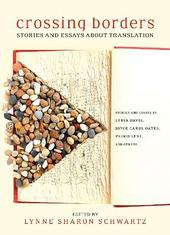
|
Crossing Borders: Stories and Essays About Translation
Hardback
Main Details
| Title |
Crossing Borders: Stories and Essays About Translation
|
| Authors and Contributors |
By (author) Lynne Sharon Schwartz
|
| Physical Properties |
| Format:Hardback | | Pages:320 | | Dimensions(mm): Height 208,Width 140 |
|
| ISBN/Barcode |
9781609809744
|
| Classifications | Dewey:418.02 |
|---|
| Audience | |
|---|
|
Publishing Details |
| Publisher |
Seven Stories Press,U.S.
|
| Imprint |
Seven Stories Press,U.S.
|
| Publication Date |
10 December 2019 |
| Publication Country |
United States
|
Description
A collection of stories and essays about translating and translators "What an astonishing collection, it seemed as if I could drink it--these pieces exude such humanness, refer effortlessly to the tender place that exists in between languages, and somehow leave you with both everything and nothing to say." --Ella Frances Sanders, author of Lost in Translation In Joyce Carol Oates's story "The Translation," a traveler to an Eastern European country falls in love with a woman he gets to know through an interpreter. In Lydia Davis's "French Lesson I- Le Meurtre," what begins as a lesson in beginner's French takes a sinister turn. In the essay "On Translating and Being Translated," Primo Levi addresses the joys and difficulties awaiting the translator. Lynne Sharon Schwartz's Crossing Borders- Stories and Essays About Translation gathers together thirteen stories and five essays that explore the compromises, misunderstandings, traumas, and reconciliations we act out and embody through the art of translation.
Author Biography
Lynne Sharon Schwartz is the author of twenty-four books, three short story collections, three essay collections, two books of poetry, and three translations from Italian. Among them are the novels Rough Strife (nominated for a National Book Award) and Leaving Brooklyn (nominated for a PEN/Faulkner Award in fiction), and the memoirs Ruined by Reading and Not Now, Voyager. She has received grants from the Guggenheim Foundation, the NEA in fiction and translation, and the New York State Foundation for the Arts. She teaches at the Bennington Writing Seminars and Columbia University's School of the Arts. Schwartz lives in New York City.
Reviews"Some of the best translation stories of our time." -Susan Bernofsky "What an astonishing collection, it seemed as if I could drink it-these pieces exude such humanness, refer effortlessly to the tender place that exists in between languages, and somehow leave you with both everything and nothing to say." -Ella Frances Sanders, author of Lost in Translation "A superb translator herself, Lynne Sharon Schwartz has a nuanced grasp of the deeper metaphysics of this transfer of energies, this crossing of psychological thresholds. Her selections are beautiful interrogations from fictional and essayistic vantages, and taken together they rejuvenate the age-old questions surrounding the translator's art." -Sven Birkerts, author of Changing the Subject: Art and Attention in the Internet Age "By turns humorous, grave, chilling, and caustic, the stories and essays gathered in this volume reveal all the splendors and all the miseries of the translator's task. Some of the most distinguished translators and writers of our times offer reflections that deepen our understanding of the delicate and sometimes dangerous balancing act that translators must perform. Translators are often inconspicuous or unnoticed; here we have a chance to peer into the realities and the fantasies of those who live in two languages, and the result is altogether thrilling and instructive." -Peter Connor, director of the Center for Translation Studies, Barnard College "When readers mistrust translation, they often do so because of this lack of isometry between languages, a disconnect that gives many of the texts within Crossing Borders: Stories and Essays about Translation their narrative impetus. Every attempt to translate well is compounded not only by endless asymmetries but also by distractions, by quarrels, by mundane realities. . . [T]hese are stories of encounters and relationships occasioned by the need to bring together different spheres of existence. No matter that the gaps revealed in translation may sometimes-as in Lydia Davis's story-cache outright murders, translation turns out to be less alchemy and more adhesive, taking languages or peoples or individual texts that had been separate and binding them together." -World Literature Today
|